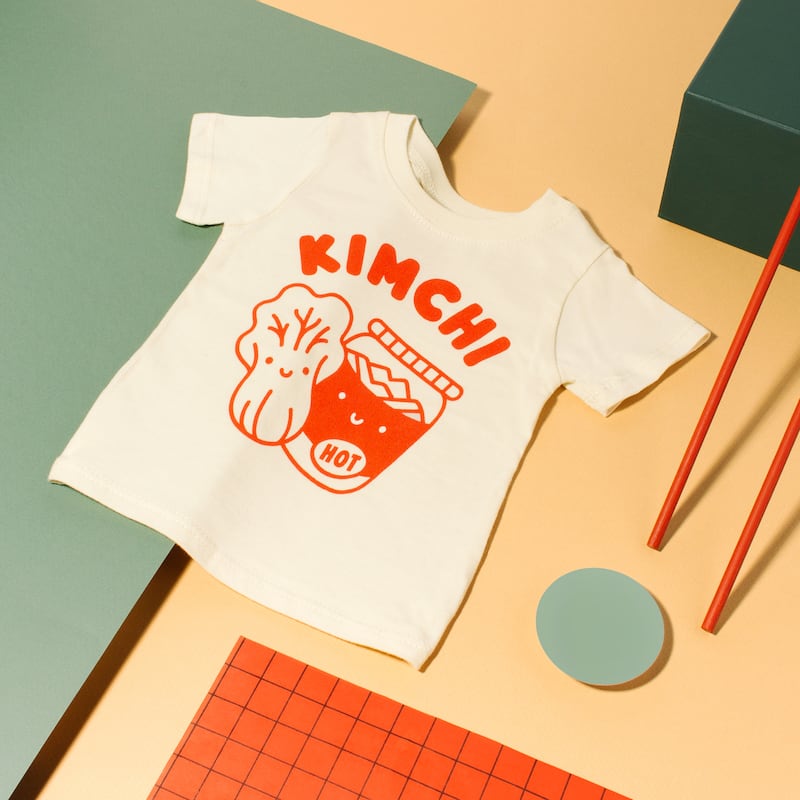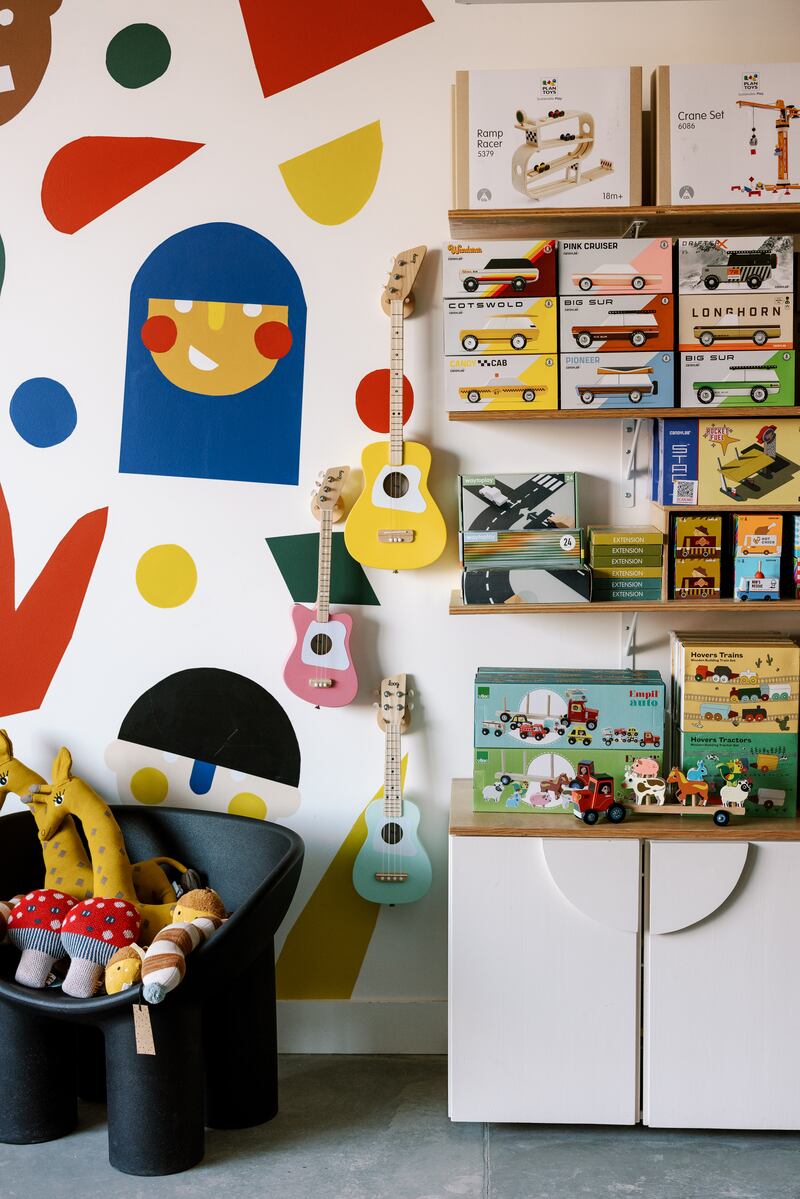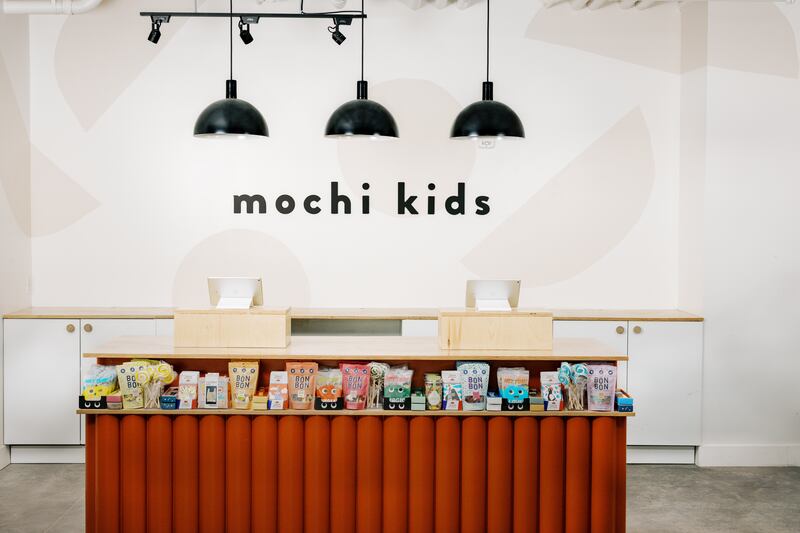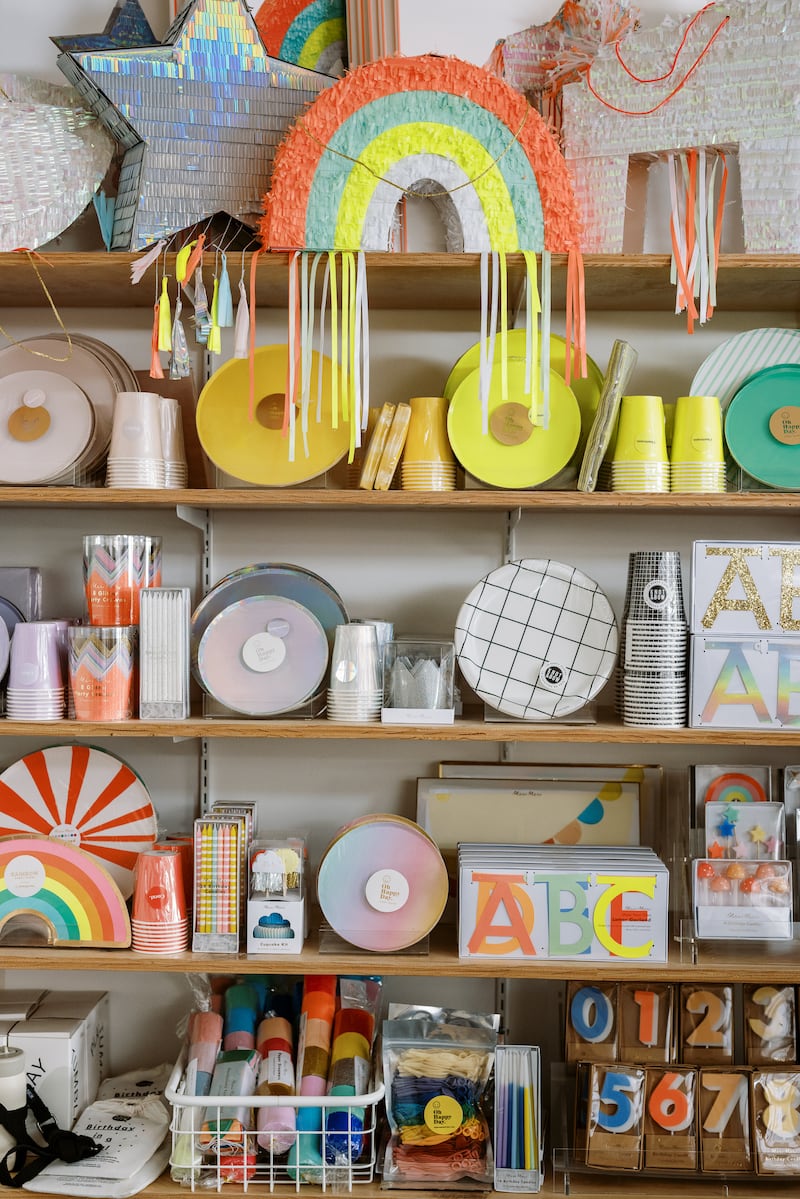After a two-and-a-half-minute tour of her impeccably curated brick-and-mortar storefront in Salt Lake City’s thriving 9th & 9th neighborhood, Mochi Kids’ founder Amanda Stewart and I grab a vacant bench a few steps from her front door for a chat. It’s a warm day at the end of a string of colder ones, making this moment feel unusually lucky.
Stewart’s company started because she wanted to give her son clothes she couldn’t find anywhere else. Taking a screen printing workshop led to creating custom-made clothing; as her hobby developed, so did her business. Requests for product piled in, and she speedily complied.
Her store opened three-and-a-half years ago, but success began with her online Etsy shop. This year marks Stewart’s tenth in business, and she’s seen it blossom in various ways.
“I feel lucky to get to do something that I love. I never thought I would have that,” Stewart says. “I used to assume everyone hated their jobs, and now I know that’s not true.”
‘I never thought this would become a business’
Mochi Kids sells carefully curated and mindfully designed “super soft, comfy, unisex clothing.” But Stewart didn’t start down this path because she necessarily wanted to be a tour de force in the crowded industry. The venture began because her son wanted shirts reflecting his interests.
In 2015, Stewart began designing and screen-printing shirts featuring snails, outer space, slugs, earthworms and leaf-cutting bees. She got to work using fairly rudimentary materials, and soon, her son was a satisfied customer.

“He would draw what he was interested in, so I got a lot of ideas from him,” Stewart says. “It was a collaborative process, so he didn’t have a big reaction [to what I made]. He knew what I was doing because I was screen printing in a corner of the playroom.”
“[The shirts] gave him confidence to wear clothes he loved that he could relate to,” Stewart says. And if that’s as far as the creative venture went, it would have been a perfectly adequate stopping point. Yet, Stewart kept designing and making shirts. When she posted her creations on Instagram, family and friends reached out in interest.
Stewart responded by creating even more items. Sales started to surface.
“When people wanted to buy what I made — people I wasn’t related to — that’s when I decided, ‘Oh, maybe I can make this into something more,’” Stewart says.
But if she was going to scale her budding operation appropriately, first, she needed to buy more screen printing equipment. To afford it, she taught paid workshops to anyone who wanted to learn.
“At that time, my purpose was ‘I’m going to teach you how to screen print,’ and not ‘I’m going to start a company,’” Stewart says. Though she had started screen printing two years prior, Stewart could do and provide much more when she opened her online Etsy shop in 2015.
“It was something I loved doing. I never thought it would become a business,” Stewart says.
In 2020, Mochi Kids added toys and stationery, including puzzles, books, washi tape and stickers. Her customers liked the additions so much that it was hard to keep them in stock. Stewart added even more items and brands to help compensate. Stewart’s business outgrew her basement when the added inventory outsized the clothing she was selling.
“Men who have built up businesses have a lot of resources available to them. It’s important that women feel equally empowered as they grow their businesses.”
— Ashley Collet
Instead of connecting with a fulfillment center to accommodate that growth, she chose to open her store instead.
“I felt like people were eager to get outside and socialize after the pandemic,” Stewart says. “Salt Lake City had a gap in the market for a modern kids’ store for modern families. I wanted it to be an inclusive space for all families to visit, with no girls’ or boys’ aisle, for example. That was the goal from the start, and it’s been fun.”
Curating causes
Mochi Kids provides unique children’s clothing, but soon after the business began, Stewart also began using it as a channel to support causes she believed in.
The company’s online verbiage backs up that mindset: “Since our founding, we’ve used our platform to raise money and awareness for causes that are important to us, from racial equity to voting rights to women’s health. We believe actions as simple as what we wear and how we spend our dollars can change the world we live in for the better.”
To that end, shirts created by Mochi Kids have helped raise funds for presidential campaigns, the Palestine Children’s Relief Fund and the Los Angeles fire tragedies.
Making shirts for these larger purposes allows Stewart and her brand to partner with artists for fundraiser designs, promoting causes she cares deeply about. It’s a way of sharing how she perceives the world and what is most important to her. She acknowledges that her policy for strong stances isn’t typical of more established brands.
“People are scared,” Stewart says. “From day one, fundraisers have been part of our brand. Supporting causes is not hard for me. It’s more natural.”

For another example, Mochi Kids showcases designs that celebrate Asian food and culture. Stewart herself is half Singaporean and half American. Her mother is ethnically Chinese, but her family has been in Singapore for many generations. She believes being biracial is a fact to be proud of, and she hopes to help others feel that way.
“I want to use our Asian-American designs to teach the next generation to love their food and culture. We didn’t have that kind of representation when I was a kid. No cute kids stores were selling Asian-influenced products,” Stewart says. “We have loyal customers who have been with us since our first day because we are outspoken about our values. It makes them want to support us.”
As a person of color, Stewart says she knows how important representation is, and she hopes her store allows for a shift in thinking, a change from all she experienced in her youth.
“I grew up in Utah as one of only a few Asian people in my school. … It was rare to find any products outside of Asian grocery stores that provided representation and celebrated our culture,” Stewart says. “I feel lucky: I get to change that for the next generation through my store. Hopefully, our customers can see their cultures in a new way through our products, teaching them to love who they are by loving their heritage.”
A little help from friends
You needn’t look hard in Stewart’s store before finding a sticker on the front counter identifying Mochi Kids as a woman-owned business. Stewart is in good company, with many female-led businesses in the area that she can learn from and brainstorm with.

“I would not have opened my brick-and-mortar store if it weren’t for the other woman-owned businesses in the neighborhood who paved the way for me. Seeing mothers like myself open stores gave me the courage and confidence to do it,” Stewart says.
Initially, Stewart’s biggest hurdle was her lack of business knowledge. Leaning on female predecessors, like Ashley Collett of nearby Salt & Honey Market, helped immensely.
“Men who have built up businesses have a lot of resources available to them. It’s important that women feel equally empowered as they grow their businesses,” Collett says. “When Amanda was getting started nearby, I immediately asked, ‘Do you want to look at my books? Do you want to see how I structure things?’”
Additional assistance came from Helen Wade, who has owned The Stockist since 2009. She’s seen Stewart drive business to the area by constantly thinking outside the box, connecting with local artists to decorate her windows and offering regular storytimes for families.
“You can’t just open a door and assume people are going to walk in,” Wade says.
By bringing in an established online brand and curating it to include toys and goods, Stewart has provided multiple reasons to visit her store. It’s brought new clients to the neighborhood, which is exactly the kind of new energy and drive shops and shop owners hope for: new customers they may have never crossed paths with otherwise.
Helping further build the community is the very reason Stewart brought Mochi Kids to Salt Lake City in the first place. Stewart hosts free events during the holidays and seasons; partners with brands, allowing them an area to showcase their products and creations; and highlights fundraisers, including the 9th & 9th giving trees, which allow customers to help the store donate books and gifts to local lower-income schools.

That outlook allows Stewart and the customers her store attracts to tap into a larger picture of what is essential, which extends much further than selling toys and clothes. It allows her to feel greater fulfillment in all she does.
“I want to have enough money to live comfortably, but it’s not a huge motivator,” Stewart says. “Enjoying what I do is. Showing my kids that they can start their own business is. I want to show them they can do what they love to do and still have values as they do so.”

